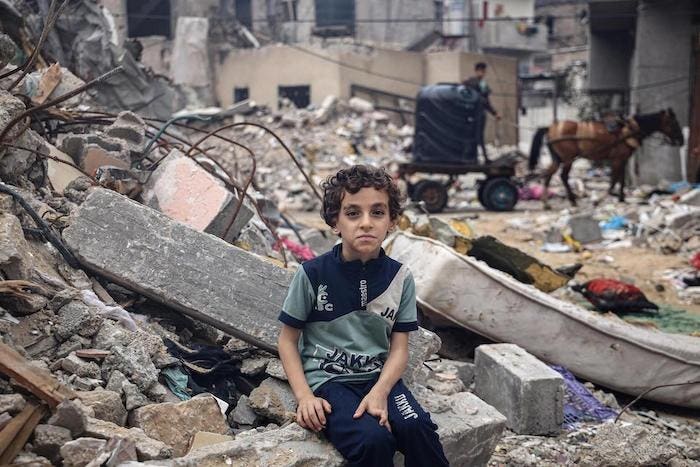Humanitarian groups, including UNICEF, are calling for an immediate end to the unrelenting violence in Gaza and the unconditional release of all hostages. Hear what the children of Gaza, caught in a catastrophic situation, have to say.
One month after at least 1,400 people, including more than 30 children, were killed and more than 200 abducted in Israel, the retaliatory bombardment of the Gaza Strip continues unabated. By Nov. 6, 9,770 people had lost their lives in Gaza, including 4,008 children, while 2.2 million remain cut off from food, water, medicine, electricity and fuel.
In a joint statement on Nov. 5, UNICEF Executive Director Catherine Russell and the heads of several major United Nations organizations renewed their call for an immediate humanitarian ceasefire, along with the immediate and unconditional release of all civilian hostages. The statement also emphasized that more aid — food, water, medicine, fuel — must be allowed safely and swiftly into the country and urged all parties to the conflict to respect all their obligations under international humanitarian and human rights law.
As bombs continue to fall on homes, hospitals and schools, UNICEF and partners are working around the clock to provide urgently needed aid to children and families struggling to survive. Below, some of those children share their hopes for peace and dreams for the future.
“I hope for a ceasefire and I dream of a future where I can return to school much sooner,” said Maryam.
“My dream is to become a nurse, and I hope the war will end soon,” said 8-year-old Salwa.
Eight-year-old Mohammed lost all his toys when his home was destroyed in an airstrike. “I wish for a ceasefire,” he said.
“I lost my house and my two brothers,” said Wafaa. “I want to return to our house, even though the chances are that we will never get back, and we will never be whole again, as everyone is losing their loved ones.”
“I want this war to reach an end,” said 14-year-old Ahmad. “I hate waiting in lines all day — water, bread, drinking water. My dream was to become a doctor but now I’m dreaming of staying alive.”
“I never imagined that I would be sitting at my school desk as a displaced boy,” said 10-year-old Ahmad. “I used to love my school and my classes … I don’t know if I would still love my school again after all of this.”
Outside a Gaza City bakery, 10-year-old Kenan said, “I’ve been waiting in this endless line since 6 a.m. just to bring some bread home for the day. Sometimes, I don’t get back to my family until five or six hours later. I miss my school the most, my only dream now is to put an end to this war and for the world to send us bread.”
“The only thing I want to share is love to the entire world,” said 11-year-old Amal. “I want them to know and to understand that we are kids like any other kid on this earth.”
UNICEF puts children first
Over half the population of Gaza is now taking shelter in crowded UNRWA (United Nations Relief and Works Agency for Palestine Refugees in the Middle East) facilities. UNICEF continues to focus on delivering as much humanitarian aid as possible to children and families in need, but access remains difficult and dangerous.
In the past week, UNICEF delivered medicines and medical suppliesto serve at least three hospitals in Gaza for an estimated 94,000 people for one week. UNICEF has also supported over 3,500 children with child protection, mental health and psychosocial support services. The needs are immediate and immense.
UNICEF won’t stop working to meet the needs of children currently facing an urgent and pressing need for protection and humanitarian assistance. Your contribution can make a difference. Please donate today.
Read the full article here





